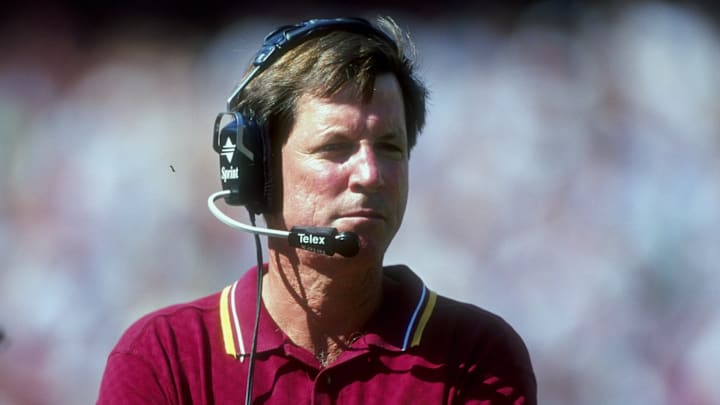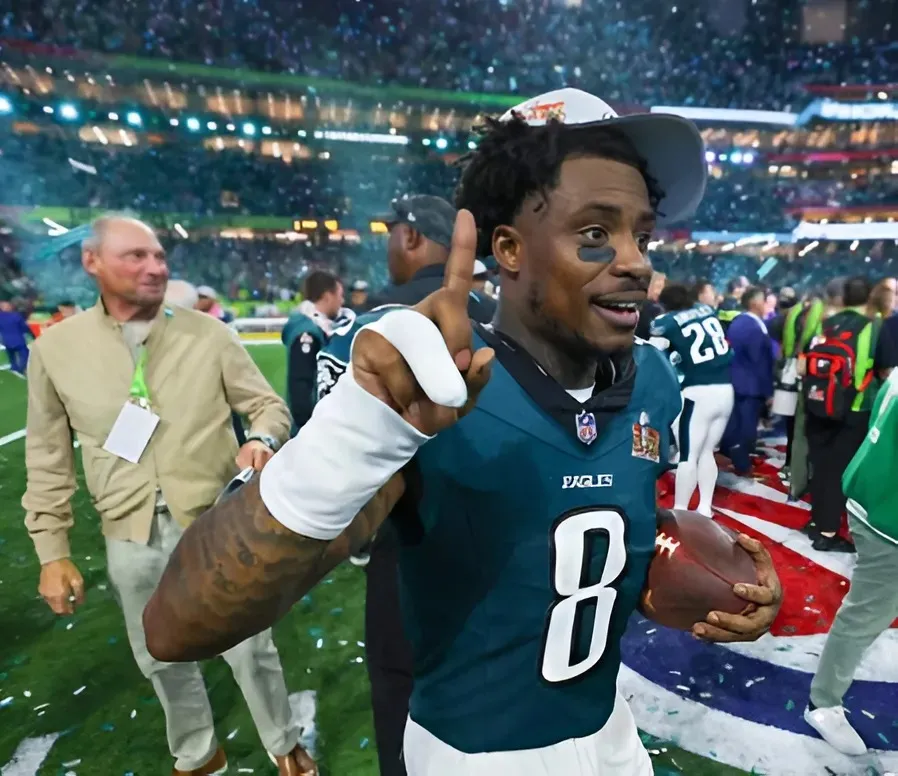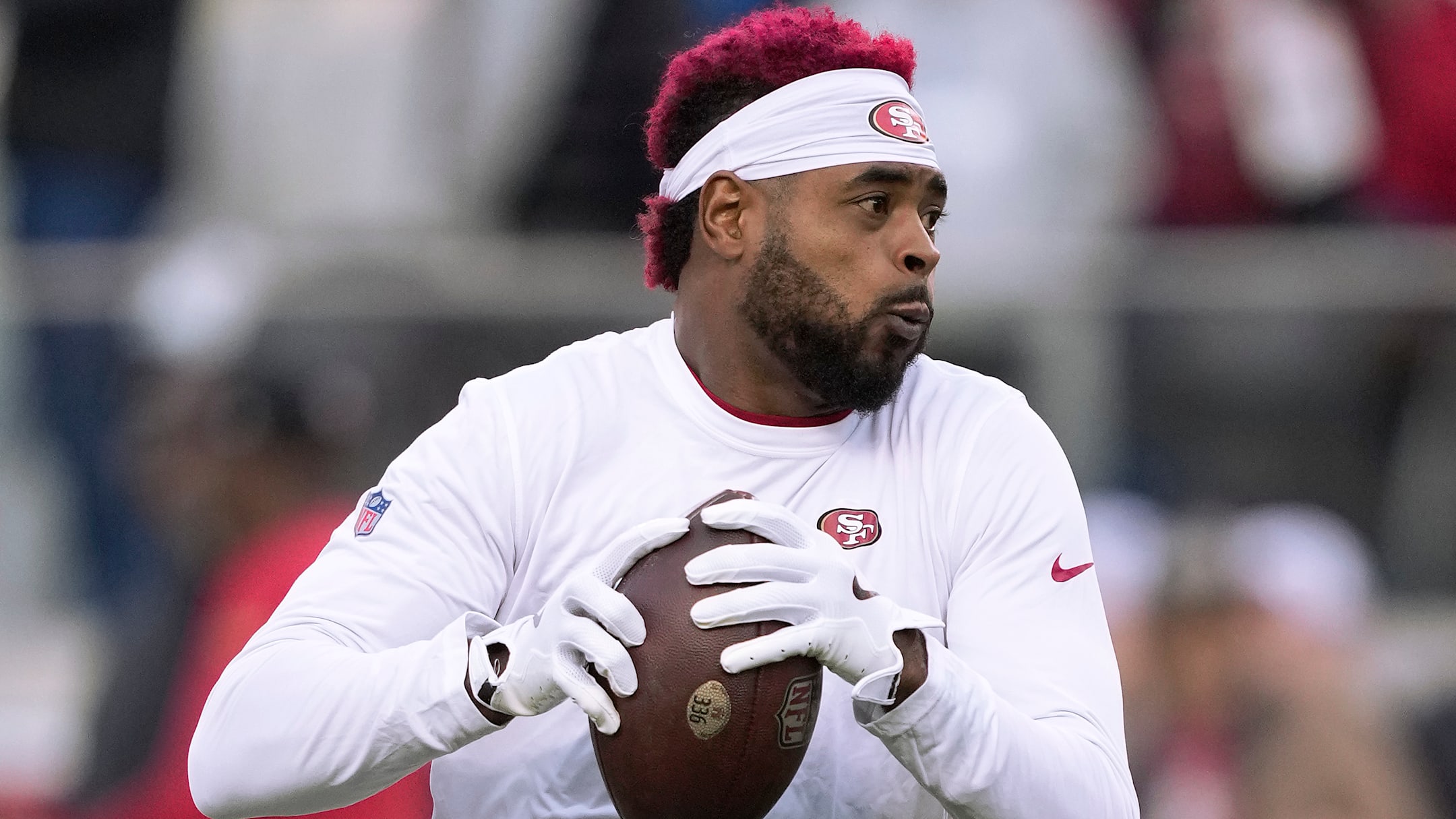Like every NFL general manager, Charley Casserly got some things right and others not so much. Most people only remember the wrong moves, especially the ones that led to a first-round draft pick who never played a down for Washington.

That's the slug line from the story of Andre Johnson, a Penn State offensive lineman that Casserly and then-head coach Norv Turner saw as the next great left tackle in franchise history. The lesser-known Andre Johnson ultimately proved anything but and was released after just one season.
So, how did Casserly and Turner get this one so wrong?
As is usually the case, the answer is far from straightforward. Certainly more complex than The 33rd Team's Barry Wilner declaring that Johnson, "to put it simply, couldn't block."
Instead, just like Heath Shuler, the franchise quarterback who never was, No. 30 overall pick Johnson was undone as much by unrealistic expectations, misguided evaluation, and poor coaching as he was by a lack of talent.
Washington's bad draft plan doomed Andre Johnson from the start
Johnson's selection was part of a three-trade draft plan Casserly was sure would make him the smartest general manager at the annual team-builders retreat. His plan started with flipping the No. 6 overall pick to the St. Louis Rams for defensive tackle Sean Gilbert.
The latter was a gifted but troubled player who performed well for Washington in 1996, but fell out with the team over a dispute about the franchise tag a year later. Casserly saw Gilbert as the game-wrecker that a soft defensive front desperately needed, but he also wanted a linchpin on the other side of the football.
That desire prompted Casserly to send second and third-round picks to the Dallas Cowboys for the rights to the final selection in the opening round. The choice became Johnson, who was tasked with replacing the great Jim Lachey as Washington's blindside protector.
A brittle but brilliant tackle, Lachey arrived via a trade involving Jay Schroeder and the Los Angeles Raiders in 1988. What followed was a pair of Pro Bowl berths, three first-team All-Pro honors, and a Super Bowl title as he anchored a refreshed version of 'The Hogs' arguably better than the original group of the 1980s.
Lachey was so good that then-owner Jack Kent Cooke wouldn't sanction his trade even when there was a chance to acquire John Elway. Few players in Washington's history boasted a reputation and pedigree to rival Lachey, so Johnson faced an uphill battle, especially after Casserly handed him a four-year, $3.6 million contract — hardly pocket change in 1996 — before training camp.
The bloated contract, combined with Lachey being such a tough act to follow, heaped a mountain of pressure upon Johnson's shoulders. He soon buckled once he got onto the field.
Early signs of trouble couldn't be ignored where Andre Johnson was concerned
Johnson was a wreck from the moment he put on the pads, and Turner and his staff couldn't ignore the signs, according to The Virginian-Pilot's Jim Ducibella:
Jim Ducibella"They were pleased when Johnson spent the offseason in Washington and was a regular in strength coach Dan Riley's workout room. Concerned that he wasn't quick enough to play left tackle, they moved him to the right side a couple of weeks ago, behind veteran Ed Simmons.
But injuries forced a move back to the left side. Johnson then had a miserable game against Miami on Thursday night. He was beaten for two sacks and consistently appeared flat-footed and reaching to keep defensive ends away from the quarterback.
'Like a lot of young players, Andre plays pretty well for three or four plays, then makes a bad one,' Turner said after the 28-7 loss.'Right now, he's not able to avoid the real bad play. When you're playing out there at tackle, that negative play has an effect on everyone.'"
Like most linemen who struggle making the grade at the pro level, Johnson's feet weren't active enough, and his play strength was feeble. He also lacked the aggression and nasty streak needed to boss tussles in the trenches.
All of those things contributed to Johnson spending 15 games inactive during his rookie year. He would never play a snap for the Burgundy and Gold during the regular season and was out of the NFL by 1998 following a three-game dalliance with the Detroit Lions.
Not even the promotion of Hogs charter member Russ Grimm to offensive line coach for the 1997 season corrected Johnson's shortcomings.
In the 1980s and '90s, there wasn't an offensive line anywhere quite like The Hogs, which won three Super Bowls in 10 years with Russ Grimm as an anchor. #GoldJacketSpotlight pic.twitter.com/isSo0j6LYE
— Pro Football Hall of Fame (@ProFootballHOF) March 28, 2023
Grimm represented a history Johnson couldn't hope to match, but the true legacy of his short-lived and ill-fated career involves what might've been for Washington in the 1996 draft.
Trading second-round value to get Johnson cost Washington the chance to select several truly extraordinary players, according to Jeff Howe of The Athletic:
"By trading up, Casserly leapfrogged Pro Bowlers Tony Brackens, Mike Alstott and Lawyer Milloy. Hall of Fame safety Brian Dawkins was also a second-round selection."
Jeff Howe
While it's easy to legislate after the fact, it's also human nature to curse what might have been. Particularly with safeties Milloy, a future Super Bowl winner with the New England Patriots, as well as Dawkins, a heavy hitter and blitz monster who tormented Washington for years with an NFC East rival.
We would like to apologize to everyone who had to line up against BDawk 😬 pic.twitter.com/QOjLayhOjg
— Philadelphia Eagles (@Eagles) June 13, 2025
Either player would have spared fans the painful sight of the pitiful tackling at safety that blighted Washington. Stanley Richard and Darryl Morrison couldn't get downhill in a hurry to impact running plays in the box, nor could they handle bulldozing backs at the second level.
Allowing a league-worst 2,275 rushing yards, 4.4 yards per carry, and 20 touchdowns on the ground doomed Washington's playoff chances. It started when a 7-2 team was steamrolled for 266 yards and five rushing scores by the Buffalo Bills in Week 10.
Better drafting would've fixed the problem. Just as snagging Brackens, a future Pro Bowl edge rusher who helped the Jacksonville Jaguars reach that season's AFC Championship game against Milloy and the Pats, would have boosted a pass rush that logged just 34 sacks.
Casserly had ample opportunities to put Turner's rebuild over the top with a smarter use of the No. 37 pick. Instead, he dealt it for Johnson's blink-and-you-missed-it career.


-1749432256-q80.webp)
-1752993711-q80.webp)